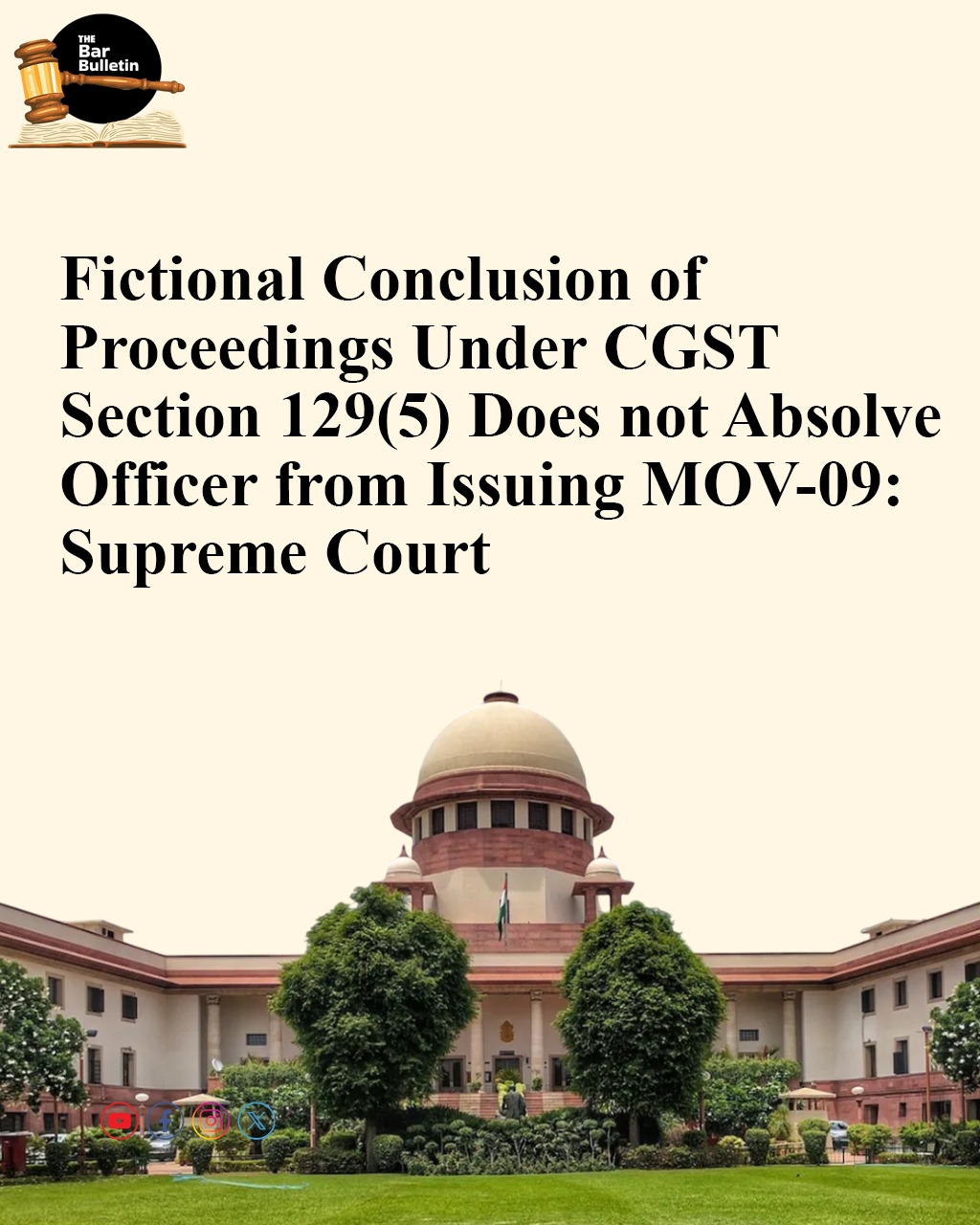The Supreme Court ruled that the deeming fiction of Section 129(5) of the CGST Act, 2017, regarding conclusion of proceedings upon payment of tax and penalty, cannot be interpreted to imply that the dealer (appellant) has agreed to waive or abandon the right to challenge the levy, a right that is protected by the very enactment itself. The Court highlighted that the term “conclusion” used u/s 129(5) merely signifies that no further proceedings for prosecution will be initiated. However, it does not absolve the responsibility of the proper officer to pass a formal order in Form GST MOV-09.
The Division Bench comprising Justice J.B. Pardiwala and Justice R. Mahadevan observed that when payment is made under protest, and objections are filed, then adjudication is not optional and it becomes imperative to pass a speaking order to justify the demand of tax and penalty, to safeguard the right of appeal u/s 107 of the CGST Act. The Bench explained that the GST payment portal permits payments only through Form GST DRC-03, which is automatically classified as a voluntary payment, and does not provide any mechanism for an assessee to indicate that the payment is being made under protest. Therefore, in the absence of such an option, payments made under commercial compulsion or business necessity, such as for securing the release of detained goods, may be erroneously construed as voluntary, resulting in undue prejudice.
In this case, the appellant, a registered dealer operating from Karnataka, consigned 17,850 kg of dry Red Arecanut valued at Rs. 51.72 lacs, packed into 255 bags, to one Diamond Trading Company in Delhi. During transit, the goods were transhipped, however, only 248 bags were loaded onto the new vehicle, with 7 bags missing from the original consignment. The said vehicle was later detained at Jhansi, based on Form GST MOV-04, alleging certain deficiencies. This led to the issuance of a notice u/s 129(3) of the CGST Act, 2017, and it was alleged that the consignee, Diamond Trading Company, was prima facie non-existent. Though the appellant denied the allegations, however deposited Rs. 7.20 lacs towards IGST because of pressing business exigencies, and the detained goods were released.
However, since no final order u/s 129(3) was passed by the detaining authority, the appellant approached the High Court, which held that when proceedings in respect of the notice u/s 129(3) of the CGST Act stood concluded in terms of the mandate of Section 129(5), the relief sought by the petitioner cannot be granted since the matter was concluded as per legislative mandate. Accordingly, the High Court refused to pass an order for mandamus to direct the respondent to pass an order u/s 129(3) of the CGST/UPGST/IGST Act.
When the matter reached the Supreme Court, Circular No.41/15/2018-GST was referred to state that the proper officer is mandated to issue the release order in Form GST MOV-05 upon payment of tax and penalty u/s 129(1) of the CGST Act. Additionally, the officer is required to pass a formal order of demand in Form GST MOV-09 and upload it on the common portal, so that the demand is recorded in the taxpayer’s electronic liability register. The Court, however, noted that in the present case, even though the respondent has released the goods and vehicle by passing a discharge order in Form GST MOV-05, upon payment of the tax & penalty by the appellant, he did not issue any final order u/s 129 of the CGST Act.
The Apex Court found that the discharge order merely records of release of the detained goods and vehicle upon payment of the proposed tax and penalty, but did not mention about withdrawal of objections or the conclusion of proceedings which was initiated u/s 129(3). Observing that procedural limitations cannot be allowed to defeat the rights of the taxpayer, particularly where the detention of goods is ultimately found to be unlawful, the Apex Court concluded that the payment made by the appellant cannot be treated as voluntary, and the absence of a mechanism to record protest should not operate to the detriment of the assessee.
Accordingly, the order of the High Court was set aside and the Department was directed to pass a reasoned final order u/s 129(3) of the CGST Act, 2017, in Form GST MOV-09.
Appearances:
AOR Pawanshree Agrawal and Advocate Aakriti Goel, for the Appellant
AOR Bhakti Vardhan Singh, for the Respondent



